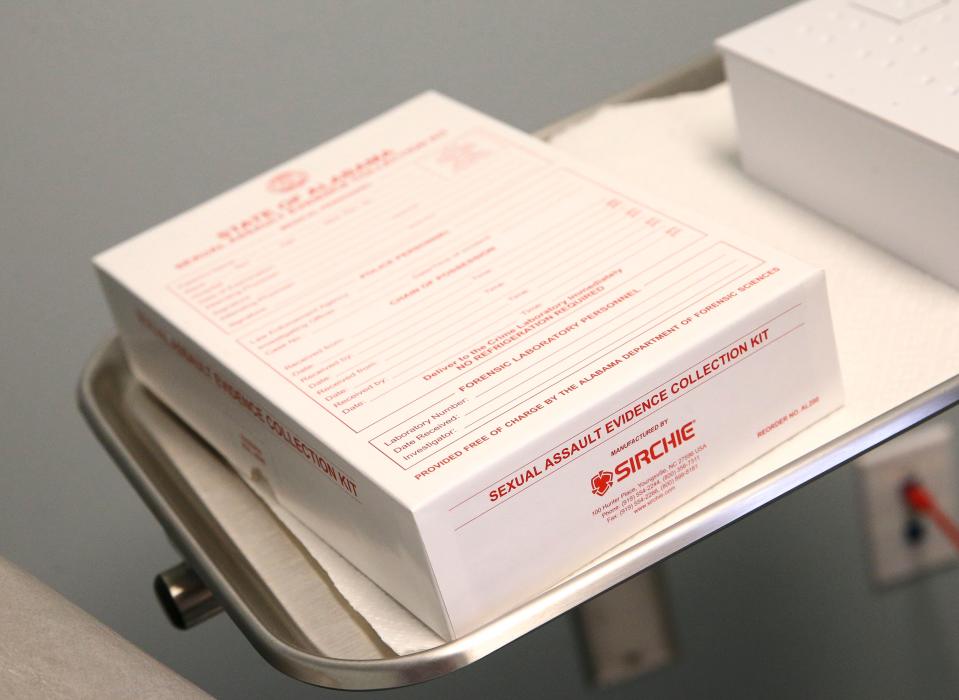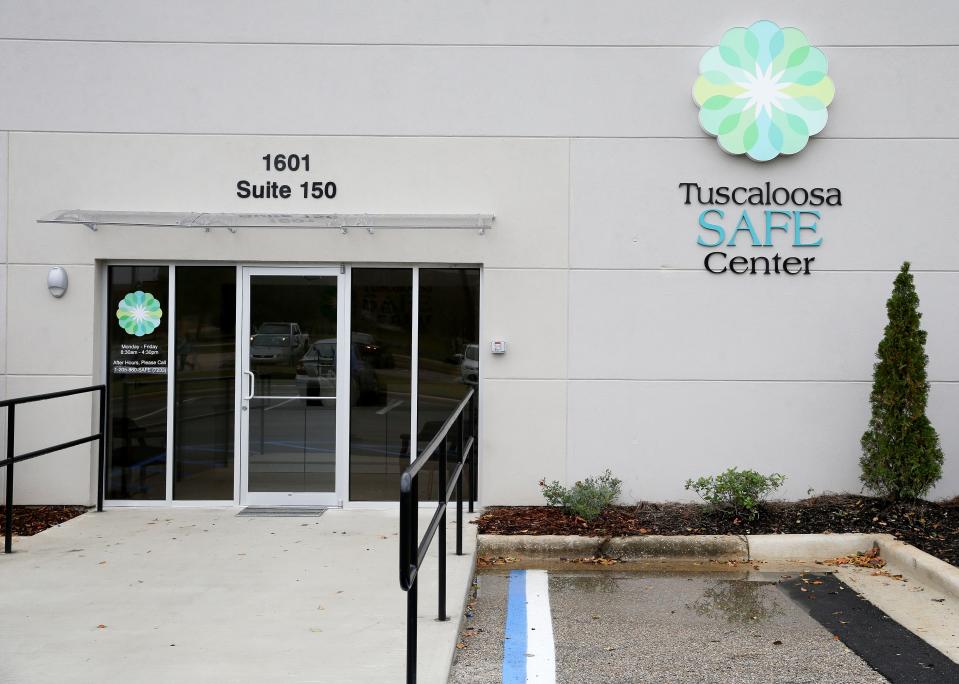Two Tuscaloosa sexual assault cases featured in Netflix 'Victim/Suspect' documentary
A new Netflix documentary sheds light on how police handle sexual assault investigations, with two Tuscaloosa cases highlighted.
The 90-minute "Victim/Suspect," which has been available for streaming since May 23, includes footage shot around Tuscaloosa and the University of Alabama campus.
Director and producer Nancy Schwartzman followed investigative journalist Rachel de Leon as she tracked sexual assault reports where the victims were arrested by police they had approached, charged with making a false report, which in most states is a misdemeanor offense.
In the process, "Victim/Suspect" spends considerable time in Tuscaloosa, on the UA campus, in Birmingham and elsewhere, following the 2016 Emma Mannion case, and recounting the 2015 Megan Rondini case.
More: T.J. Bunn Jr. settles Megan Rondini lawsuit days before trial set to begin
With assistance from the Center for Investigative Reporting — founded in 1977 as the country's first non-profit investigative news organization, out of Emeryville, California — and by hiring attorney Dennis Bailey, general counsel for the Alabama Press Association, de Leon and her team study reams of evidence over years, including audio-video from police interrogations; written police documents; video surveillance footage; personal video-phone-camera footage; court documents and more.
Once de Leon sells Amanda Pike — she's the executive producer for films and series at Reveal, CIR's flagship platform — that there's a pattern of more than 160 such cases across the U.S., she's given help from a team that helps dig, though de Leon remains central.
![People gather and march in support of Megan Rondini along University Blvd. in Tuscaloosa Friday, September 8, 2017. Russ Yetter hugs his wife Robyn after she spoke. They are relatives of Megan's and traveled from Texas to participate in the march. [Staff Photo/Gary Cosby Jr.]](https://s.yimg.com/ny/api/res/1.2/fNIerDnd.j73UssfxQpRDQ--/YXBwaWQ9aGlnaGxhbmRlcjt3PTk2MDtoPTc4MQ--/https://media.zenfs.com/en/the-tuscaloosa-news/d5315291d1187678396e1c1c8acd1d95)
Featured in the documentary: two women who went from victim to suspect, sometimes in the same day. Viewers also hear from Detective Carl Hershman, a 32-year-veteran of the San Diego Police Department who, during 10 years with its Sex Crimes Unit, investigated more than 1,300 sexual assault cases. And Lisa Avalos, lawyer and professor at LSU Law, who specializes in criminal law and procedure regarding sexual offenses and gender-based violence.
No one, officers or advocates, denies police frequently use what they call ruses — claiming to have evidence they do not possess — to try and convince someone reporting an assault that there's recorded imagery, or testimony, that refutes their word. Aside from Hershman, the only law enforcement officer who agreed to be interviewed for the documentary was Detective Walberto Cotto Jr. of the Bridgeport (Connecticut) Police Department. Cotto spoke openly about using a ruse with Nikki Yovino.
Yovino accused two Sacred Heart University football players of forcing her to perform sexual acts. After Cotto interrogated her, Yovino was arrested for falsely filing a police report and sentenced to a year in prison. Investigators stake accusations on inconsistent details.
Though de Leon spoke with her, Yovino didn't agree to be interviewed for the film.
"Inconsistent statements are not red flags. There's a reason for them," Hershman said, including emotional distress, and the willingness of many to submit to authority, to bend toward ruses.

Every year, more people report sexual assaults, he says, but too often, there've been fewer detectives available to investigate.
"Sex crimes are always gonna take longer to work than other crimes, and if you're already holding 30 cases to 40 cases, you could end up shortcutting your investigative process," Hershman said. So if an investigator gets a reporting victim to decline, or recant, numbers come down.
It's noted that these cases do not involve empowered middle-aged women, but young women, some barely out of high school and their parents' houses, who may not know their rights, and how to advocate for them. Hershman underscored how easy it is to talk an 18-year-old out of coming forward, telling her the district attorney's office won't look kindly on the fact that the woman was seen socializing with the alleged assailant, and oh, you're drinking underaged, so do you have a fake ID?
"'OK, thanks.' Click, bang. Sign it off, hand it in," he says.
But such techniques don't help, says Avalos, author of the journal article, "Policing Rape Complainants: When Reporting Rape Becomes a Crime," among many others.
"Police officers in this country are allowed to lie to you," she says. "And they don't have to indicate in the police report that they lied to you, they don't have to say that....
"You're not getting the truth out when you do these kinds of things. You are confusing a person who's already traumatized, and already has memory difficulties."
Midway through the documentary, de Leon speaks about how she can't fall into the trap of becoming a victim's advocate. In her interviews, she maintains a calm demeanor, asking questions of all in the same even tones. As she walks with Mannion through UA and Tuscaloosa streets, passing familiar stately buildings, bars and restaurants, she stands by impassively as the young woman reacts physically to standing on ground where she said the assault occurred, a gravel lot on The Strip. Later, in sharing what she's gathered with her fellow journalists at Reveal/CIR, emotions sometimes arise.
Her role as journalist insists she stick with uncovering facts. Among those are the widespread use of ruse, which is derived from the Reid technique, developed in the 1950s. It's essentially the good-cop/bad-cop scenario, designed to to create high pressure, followed by sympathy and offers of help, but only if a confession is imminent.
And then there's this: In some of these cases, the alleged abusers weren't interrogated by police.
Megan Rondini case
After viewing gathered evidence, Hershman comments on cases, including when Tuscaloosa's T.J. Bunn Jr. was accused of assaulting Rondini, who was a UA student at the time.
"They don't interview (Bunn) on a sexual assault that occurs just hours before that," Hershman says. "They let him go on a fishing trip with his attorney. ... The investigator gave (Bunn's) statement to him."
A grand jury decided not to indict Bunn. Rondini later died by suicide. After lawsuits filed by her family, UA committed $250,000 and UA staff in key roles for the Tuscaloosa SAFE Center Inc., for facilities and services to aid and support victims of sexual assault. UA also committed $150,000 toward continued efforts to address sexual misconduct issues, and $50,000 toward a Megan Rondini scholarship.
Though Tuscaloosa and UA officers, including Sheriff Ron Abernathy, appear in the documentary, Tuscaloosa metro homicide unit Capt. Gary Hood and Tuscaloosa Violent Crimes Unit Investigator Jared Akridge don't agree to be interviewed by de Leon. She's seen at the Tuscaloosa County Courthouse, outside the sheriff's department and, on one weekend, at Abernathy's house. He answers the door, but again refuses to speak with the reporter.
"When a false report is made like this, then the person that makes the report such as that, well, they need to suffer the consequences," Hood says, speaking at a news conference in 2016, after Mannion was arrested.
When they discuss false reporting, officers cite costs and the manpower involved in investigations. False or recanted reports, they say, take attention from other cases.

Avalos says false reports are rare, with the most reliable studies suggesting 2% to 10%.
"The much, much bigger concern people should have, including men, is that they could be sexually assaulted," she says. "At least one out of every three women, and at least one out of every six men, will be a victim of sexual assault in their lifetime.
"Then their perpetrator could be left to re-offend."
Unlike some services, Netflix releases regular numbers on viewership, or at least hours played. For its first week of release, May 22-28, "Victim/Suspect" was No. 6 in its list of top movies watched, with 6,600,000 hours viewed. Netflix is the largest streaming service, with 232,500,000 subscribers worldwide.
Reach Mark Hughes Cobb at mark.cobb@tuscaloosanews.com, or call 205-722-0201.
This article originally appeared on The Tuscaloosa News: Netflix documentary on sexual assault features two Tuscaloosa cases

